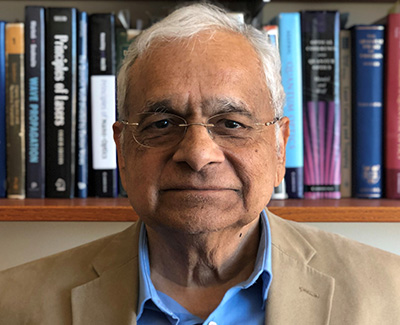2022 Charles Hard Townes Medal Winner
Get Involved
Optica Names Girish S Agarwal the 2022 Charles Hard Townes Medal Recipient
Optica (formerly OSA) is pleased to announce that Girish S Agarwal, Texas A&M University, USA, has been selected as the 2022 recipient of the Charles Hard Townes Medal. Agarwal is honored for discoveries in theoretical quantum optics especially vacuum induced coherences, photon added coherent states, non-classical cat states for qubits via engineered many body interactions, and transparency in optomechanical systems.
 Girish S Agarwal received his MS degree from Banaras Hindu University, India, and his PhD from the University of Rochester, USA. He is currently a Distinguished University Professor at the Texas A&M University. He also holds The INFOSYS Foundation Chair at the Indian Institute of Science and held J R D TATA Chair at The Tata Institute of Fundamental Research and Einstein Professorship, Indian National Science Academy.
Girish S Agarwal received his MS degree from Banaras Hindu University, India, and his PhD from the University of Rochester, USA. He is currently a Distinguished University Professor at the Texas A&M University. He also holds The INFOSYS Foundation Chair at the Indian Institute of Science and held J R D TATA Chair at The Tata Institute of Fundamental Research and Einstein Professorship, Indian National Science Academy.
Agarwal is an influential physicist with magisterial works in quantum optics. A key part of his work involved studying the non-classical properties of light, and how this light interacts with atoms leading to nonclassical states like CAT states of many qubit systems. He has several firsts to his credit - development of quantum statistical framework for studying cooperative effects like superradiance; fluctuation dissipation theorems for nonequilibrium systems; quantum electrodynamics with anisotropic vacuum; surface excitation produced enhancement of QED effects; enhancement of the nonlinear optical effects and control of phase matching with control electromagnetic fields; and sample size dependence of the vacuum Rabi splittings.
He has published more than 700 papers and authored two books on quantum optics. He is a Fellow of Optica, the American Physical Society, the Indian National Science Academy, The Royal Society, and The World Academy of Sciences (TWAS). He is work has been recognized with Optica’s Max Born Award, the TWAS Award in Physics, and the Humboldt Research Award.
Established in 1980, the Townes Medal recognizes an individual or group for outstanding experimental or theoretical work, discovery or invention in the field of quantum electronics. The medal honors Charles Hard Townes, whose pioneering contributions to masers and lasers led to the development of the field of quantum electronics. Bell Laboratories, Hewlett-Packard, The Perkin Fund and students and colleagues of Charles Townes endowed the award.
About Optica
Optica (formerly OSA), Advancing Optics and Photonics Worldwide, is the society dedicated to promoting the generation, application, archiving and dissemination of knowledge in the field. Founded in 1916, it is the leading organization for scientists, engineers, business professionals, students and others interested in the science of light. Optica’s renowned publications, meetings, online resources and in-person activities fuel discoveries, shape real-life applications and accelerate scientific, technical and educational achievement.
